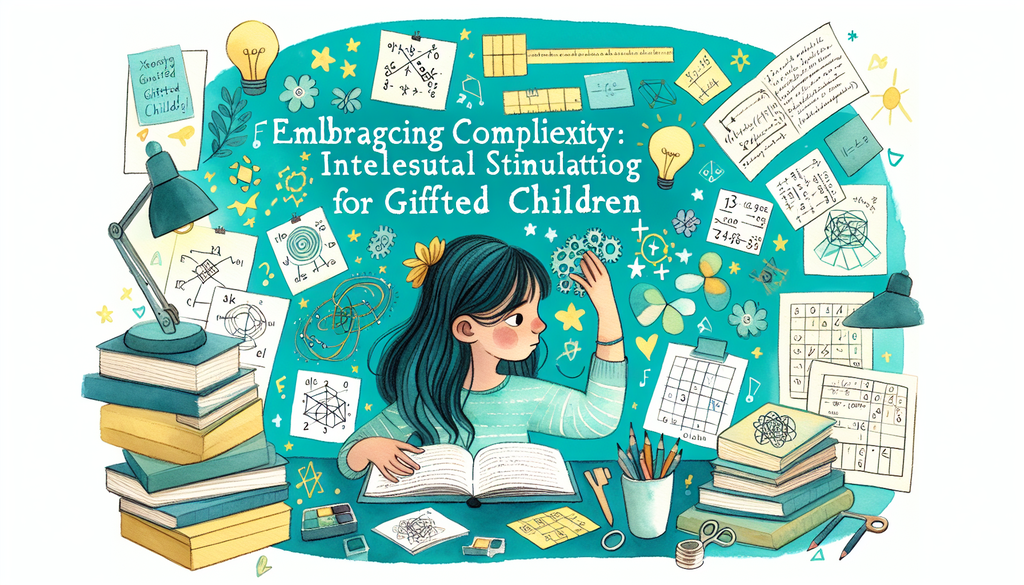Embracing Complexity: Intellectual Stimulation for Gifted Children

Gifted children are complex individuals. Their intense curiosity, rapid learning abilities, and deep thinking often leave them feeling disconnected from their peers. As such, they require unique forms of intellectual stimulation to meet their distinctive academic, psychological, and emotional needs. Today, we’ll delve into the types of intellectual challenges beneficial for gifted children and ways parents and educators can provide these stimulating opportunities both at home and in school.
The Need for Intensity
Gifted children thrive on intensity. They have a strong desire to delve deep into topics they’re passionate about, often spending hours tirelessly exploring subjects beyond surface-level understanding. It’s not uncommon, for example, for a gifted child to become so engrossed in a subject such as astronomy that they spend countess hours studying star charts, investigating space missions, or learning about the physics of the universe.
These children need the freedom to immerse themselves without the risk of being held back by traditionally-paced curriculum that may feel restrictive or uninteresting. For this very reason, letting gifted children skip ahead or providing access to advanced materials can be extremely beneficial to them, as it encourages their natural desire to learn and grow without restriction [/Breaking-Myths-The-Reality-of-Raising-a-Gifted-Child/].
Intellectual Stimulation at Home
At home, parents often play a crucial role in nurturing their child’s intellectual curiosity. Following your child’s lead and finding resources related to their interests can be one of the easiest ways to support their learning. Encourage questions, promote independent exploration, and provide tools for further learning, from books to online courses and more.
Family discussions are also a wonderful way to stimulate a gifted child’s mind. Engage them in age-appropriate conversations about current events, philosophical topics, or your own professional field. You might be surprised by their insights and thoughtful contributions to these dialogues.
Another effective strategy is to plan trips to libraries, museums, or historical sites, personalizing these excursions to your child’s interests. Is your child interested in dinosaurs? A trip to a natural history museum could be in order! Have they been reading up about the Civil War? A historical battlefield visit could leave them thrilled.
Finally, including your child in problem-solving situations around the house can be incredibly stimulating. Whether it’s planning the family budget, figuring out how to repair a broken toy, or devising the best route for a family trip, challenges like these help gifted children apply their thinking to real-world scenarios and feel valued in the process [/Giftedness-and-Anxiety-Coping-Mechanisms-for-Parents-and-Children/].
Intellectual Stimulation in School
In school, teachers have an important role to play in enhancing the intellectual stimulation of gifted children. Differentiated instruction can ensure they are continuously being challenged and growing. This might mean varying the degree of complexity of tasks, giving students choices in their learning, or creating classes or clubs that cater specifically to gifted and talented students.
Exposure to a diverse curriculum that includes complex subjects not typically covered in standard curriculums can also be beneficial. This could range from studying ancient civilizations to learning about quantum physics or participating in a Socratic seminar.
Moreover, gifted children should be given opportunities to participate in projects or research that hold their interest and require them to think critically, logically, and creatively. They should also be encouraged to participate in competitions, academic or otherwise, as they provide an opportunity to learn how to face failure, success, and healthy competition [/Spotlight-Story-Overcoming-Learning-Disabilities/].
Additionally, technology integration can be valuable in providing intellectual stimulation for gifted students. With numerous online platforms and digital tools available, technology can offer a vast array of opportunities for independently-paced learning, virtual field trips, web-based projects, and connecting with other learners or experts around the globe [/Bridging-the-Gap-Technology-Integration-for-Gifted-Education/].
Always Engage, Never Enforce
It’s crucial to remember that while gifted children need intellectual stimulation, they should never be forced into activities. Engagement in higher-level thinking should come naturally out of interest and desire for mastery. Ensure the child continues to enjoy learning, associate it with fun and satisfaction, and resist pressure to perform or conform to expectations. After all, their greatest gift is their love of learning, and it should always be nurtured above all else [/Gifted-Kids-and-Perfectionism-Finding-Balance/].
In sum, raising gifted children requires understanding their unique intellectual profiles, providing appropriate intellectual stimulation, and ensuring they remain engaged, challenged, and in love with learning. This is an ongoing journey, but it’s remarkable to observe how these eclectic thinkers can achieve amazing things when they’re allowed to embrace their complexity and develop at their own pace.